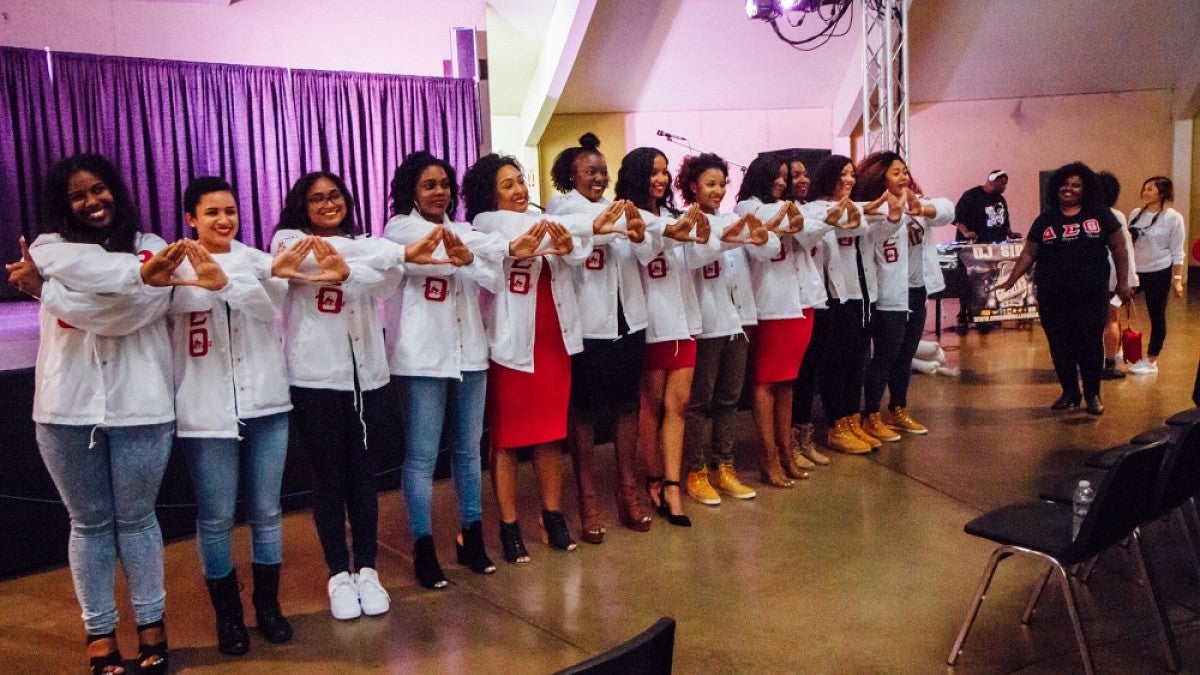More than 80 years after the first chapter was established in the Northwest, historically black Greek-letter organizations could be coming to the University of Oregon.
As part of the UO’s efforts to respond to concerns raised by black students, chapters that are part of the National Pan-Hellenic Council’s “Divine Nine” black fraternities and sororities have been invited to assess the opportunities for establishing new campus organizations. The process already has helped the UO reconnect with one of its first black students.
RELATED LINKS
Nellie Louise Franklin was the first documented African-American woman to graduate from the University of Oregon, earning a music degree in 1932. She had wanted to join a sorority while at the UO, but campus and Greek life policies prevented her from doing so.
After graduation, she and several other women established the first African-American Greek-letter organization in the Pacific Northwest — the Alpha Omicron chapter of the Delta Sigma Theta Sorority — giving black students a way to participate in the shared values and service mission of Greek life.
This past spring, Delta Sigma Theta returned to campus, leading the way for National Pan-Hellenic Council and historically black Greek-letter organizations, to once again be part of the UO’s Fraternity and Sorority Life.
The UO has invited six historically black Greek-letter organizations to campus to hold informational sessions and gauge interest in establishing a UO chapter. This is one of the initiatives announced by President Michael H. Schill to enhance diversity and inclusion at the UO in response to a list of demands made by the Black Student Task Force in December.
“Each organization must abide by its national rules for establishing a new chapter, but there’s a lot of interest, by both students and alumni, to have stand-alone chapters of each black Greek-letter organization on campus,” said Quantrell Willis, assistant dean of students in the Division of Student Life. Greek organizations that are officially recognized by the university have access to more resources and support.
Delta Sigma Theta held an information session on campus this spring, setting in motion a membership intake process that ended with a new member presentation. Phi Beta Sigma Fraternity Inc. and Zeta Phi Beta Sorority Inc. are expected to start the process fall term. Alpha Phi Alpha Fraternity Inc., Alpha Kappa Alpha Sorority Inc. and Omega Psi Phi Fraternity Inc. are the other National Pan-Hellenic Council organizations invited to campus.
“Students involved in fraternity and sorority life develop into leaders on campus. They are involved in both service and philanthropic projects,” said Justin Shukas, UO director of fraternity and sorority life. “Research shows they tend to have more attachment to the institution and higher job satisfaction.”
Fraternities and sororities focus on shared values and service-oriented missions. Members find mentors within their organizations and build lifelong friendships.
“Many current and past African-American leaders have Greek backgrounds. Historically black Greek-letter organizations come together around social action and service projects. Through their involvement, they provide various programs while engaging with others in dialogue across different issues,” Willis said. “They also provide a sense of community on campus and a place for students to find their identity within the organization.”
For many black students on campus, being part of an active Greek life is also about establishing a family legacy connection to a community while continuing the work of those who came before them.
“Prospective students tour campus and ask about Greek life, mostly because of their parents’ involvement or they were mentored by an individual that is part of a Greek organization. Others ask because they’ve seen or read about historical figures, entertainers or sports stars in (National Pan-Hellenic Council) organizations,” Willis said. “They want to share that common bond with their family, mentors, community members and those they look up to, and now they have that option.”
—By Heidi Hiaasen, University Communications


